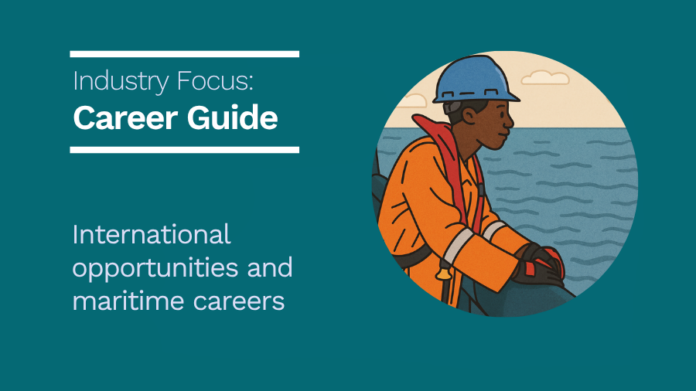For many former military personnel, the desire to explore the world doesn’t stop when they hang up their uniform. A wide range of international and maritime careers can offer the adventure, discipline, and sense of purpose that veterans often seek in civilian life. These sectors not only value global awareness and resilience – they depend on it.
From shipping lanes and offshore operations to overseas security and aid delivery, the opportunities are as varied as the destinations. Whether you’re drawn to the sea, international development, or global logistics, your military experience may be the perfect passport.
Global demand for transferable skills
In the international job market, British veterans are often highly regarded. Military service typically involves operating in unfamiliar environments, responding to high-pressure situations, and adapting quickly—all qualities that international employers actively seek.
Many overseas roles require a combination of independence, reliability, and operational awareness. Veterans with experience in supply chains, maritime operations, security, or engineering often find themselves especially well placed to move into global roles. And for those accustomed to working in multinational forces or UN operations, the cultural awareness and diplomacy required for international careers is already second nature.
Working at sea and around ports
For those with a naval or logistics background, maritime careers can feel like a natural continuation of service life. The UK has one of the largest maritime sectors in Europe, and international shipping remains a critical part of global trade.
Commercial shipping, offshore energy, and port operations are all areas where veterans can thrive. Roles range from working as marine engineers or vessel crew to coordinating port logistics or overseeing compliance and safety inspections.
The Merchant Navy, for example, continues to offer seafaring roles with structured training and the potential to travel widely. Meanwhile, shipping companies, cruise lines, and offshore contractors often recruit those with experience in navigation, engine room operations, or radio communications.
Port-side, former logistics personnel may be drawn to freight coordination, container tracking, or customs and inspection services. Health and safety, security clearance, and crisis response skills are also in demand in these high-traffic environments.
Offshore energy and engineering
The offshore wind and oil and gas industries require significant manpower—particularly in roles involving mechanical systems, rig maintenance, diving, underwater welding, and environmental monitoring. These jobs often follow rotational patterns (e.g. two weeks on, two weeks off) and involve operating in physically demanding environments, something veterans are well prepared for.
The growth of clean energy has also brought a rise in offshore infrastructure roles linked to wind farms and subsea cables. These positions often require training in survival at sea and offshore safety protocols, many of which overlap with military standards.
Security and risk roles overseas
Many ex-military personnel move into international security work—ranging from private security and close protection to maritime anti-piracy operations and NGO security coordination. These roles often involve high levels of responsibility, risk assessment, and contingency planning.
Former service members may also find work with international aid organisations or contractors that operate in post-conflict or disaster-prone regions. These roles aren’t limited to security; logistics, camp operations, and medical support are often needed as well.
While some international security work can be high-risk, many veterans are drawn to the sense of mission and the opportunity to operate in high-tempo, complex environments.
Working with global NGOs and government organisations
For those who prefer to serve in a humanitarian or development context, there are opportunities with global NGOs, the UN, and development agencies. Logistics coordination, transport planning, field operations, and infrastructure support are common areas where veterans can contribute.
Experience in peacekeeping, cross-cultural communication, and working under pressure is valued highly in these roles. Some require additional training or qualifications, but many NGOs offer induction programmes for candidates with operational field experience.
Certifications and funding your training
If you’re considering maritime careers or international opportunities, several recognised certifications can strengthen your prospects. Sea survival training, STCW (Standards of Training, Certification and Watchkeeping for Seafarers), offshore medical certificates, and security-related qualifications are often required or preferred.
The Enhanced Learning Credits (ELC) scheme can help fund relevant training. For maritime careers, this might include marine engineering courses, officer cadet training, or health and safety qualifications like NEBOSH. For international work, certifications in security management, humanitarian logistics, or NGO operations are available through approved providers.
The Maritime and Coastguard Agency (MCA), Merchant Navy Training Board (MNTB), and institutions such as the Nautical Institute are useful starting points for finding recognised training and employment schemes.
Support and career guidance
The MOD Career Transition Partnership (CTP) offers resettlement advice and job matching services for those seeking international placements. SaluteMyJob and the Forces Employment Charity also work with employers and training providers across both the maritime and global development sectors.
Specialist recruitment agencies that focus on offshore, maritime, and international logistics roles regularly advertise positions suited to veterans, particularly those with security clearance or operational leadership experience.
In summary
If you’re looking to combine purpose with travel, routine with challenge, or structure with adventure, then international and maritime careers offer a world of opportunity—literally.
Whether you’re working at sea, supporting global operations, or helping to rebuild communities abroad, the experience and mindset you bring from military life can be your strongest asset.
Keep an eye on Pathfinder’s ‘life after service’ series for more ideas on where your next chapter might take you.
Want the latest news straight to your inbox? Subscribe to our free weekly newsletter!
Interested in sales, marketing or business skills courses and training? Check out our training partner, Learning Room.
Got an enquiry? Click here.

